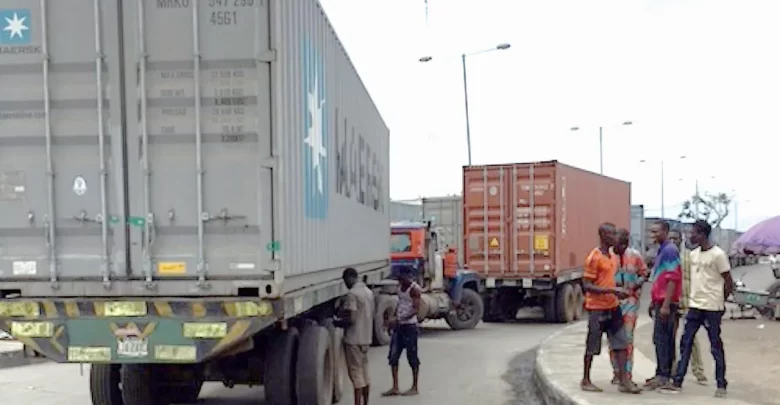
By Joshua Yousouph
Truckers and haulage transport associations operating within the Lagos maritime corridor have distanced themselves from the growing number of alleged extortion points along the Lagos port access roads, even as truck drivers say they lose over ₦200,000 per trip, due to unchecked levies imposed by multiple task forces.
Despite claims that only the Lagos State Truck and Cargo Operators Committee (LASTCOC) and the Nigerian Ports Authority (NPA) are currently authorized to operate along the Lagos port corridor, fresh allegations by truckers reveal a grim picture of extortion, unregulated payments, and operational inefficiencies leading to massive daily financial losses.
Truck owners and drivers who spoke to Shipping Position Daily say they now spend upwards of ₦200,000 per trip, depending on how many illegal checkpoints they pass and the nature of the goods they’re carrying. These fees are often demanded in cash, with no receipts or traceable records, and failure to comply often results in delays, intimidation, or even physical abuse.
For instance, with an average of four to five checkpoints encountered per trip between Lillypond and Apapa port and each demanding up to ₦15,000, a single truck can lose ₦60,000 to ₦75,000 per trip, not accounting for informal “appreciation” payments. In extreme cases, drivers reportedly face as many as 20 extortion points, with total expenses nearing ₦200,000.
Speaking exclusively with Shipping Position Daily last week, the Chairman of LASTCOC, Alhaji Lukman Shittu Zangalo, debunked widespread reports about the presence of multiple task forces operating in Apapa, clarifying that only a limited number of authorized bodies are currently active in the port access corridor.
According to him, only the Lagos State committee (LASTCOC), which manages traffic, and the Nigerian Ports Authority (NPA), which oversees import and export verification, are currently operational. Zangalo vividly outlined a structured checkpoint system from Ijora Olopa to Eleganza, where NPA and other relevant authorities verify truck documents at multiple locations, including Danlami, Area B, and Eleganza, before allowing access to the ports.
Dismissing claims of multiple unions and associations such as Maritime Workers Union of Nigeria (MWUN), Association of Maritime Truck Owners (AMATO) and National Association of Road Transport Owners (NARTO) and others operating independent task forces, the LASTCOC Chairman clarified that while there is collaboration between these maritime and transport associations, these collaboration does not equate to operating task forces.
Speaking on allegations of extortion and illegal payments on port access roads, Zangalo noted that while there are no enforced payments, drivers sometimes offer “appreciation” tokens of ₦500 or ₦1,000 to those controlling traffic.
“I think for now, there’s not any task force in Apapa right now. We only have the Lagos State Committee controlling traffic, and their main concern is ensuring that the second lane remains open for car users.
“We have understanding between ourselves in the maritime industry, so that we work together, but we are not a task force. We just want to be on the same page whenever challenges arise. For flatbed trucks, I sometimes give my drivers ₦8,000 to share small amounts at checkpoints—not because they’re compelled, but just for appreciation,” Zangalo said.
On his part, veteran truckers’ leader and President of AMATO, Chief Remi Ogungbemi, decried the alarming proliferation of task forces along the Apapa port access roads, describing them as a “clog in the wheel of progress” and a major source of exploitation for truck operators.
Chief Ogungbemi said truckers have become a “cash cow” for various unregulated groups parading as task forces, who are not only extorting money, but also harassing and physically assaulting truck drivers. Although he could not give the exact number of task forces operating across the port corridor, he lamented their constant reappearance, even after official announcements claiming disbandment.
“They have turned us into a cash cow where they can always get money. We are not relaxing. That’s why we’ve collaborated with the Maritime workers union and other transport associations to checkmate these unscrupulous elements. Sometimes they say they’ve disbanded one, and in a few weeks, another springs up. That’s what we constantly face,”
A trucker, Mr. Collins Ekene, alleged that multiple groups claiming to represent various interests now demand payments from truckers at different points along the corridor.
Mr Ekene alleged that drivers are being forced to pay between ₦10,000 and ₦15,000 at various points, and in some cases, access fees skyrocket to as high as ₦200,000, depending on the location and nature of goods being transported, especially for empty containers or flatbed trucks.
He said some truckers encounter 15 to 20 extortion points from the time they enter the access long road to when they exit the port.
“We don’t know where the money goes. It’s not to the federal government, not to NPA, not to Lagos State government. It’s just individuals with no accountability. We can’t maintain our trucks anymore. We are dying,” he lamented.
When contacted, the National Secretary of AMATO, Mr. Sani Bala Muhammed distanced its association from reports linking it to the sale of access tickets to truck drivers operating in Lagos ports. He categorically denied AMATO’s involvement in the issuance or sale of any form of ticket.
Muhammed clarified that the only legitimate ticket being issued to truckers is from the LASTCOC, which is backed by the Lagos State Government. “For your information, AMATO doesn’t sell tickets. I cannot speak for NARTO or MWUN; whether they sell tickets or not. But the truth is that AMATO doesn’t sell tickets. It is only LASTCOC that sells tickets and the ticket belongs to the Lagos State Government. The LASTCOC ticket is sold for N3,000” Bala clarified.















